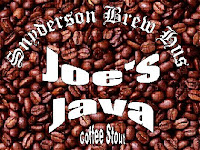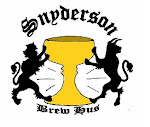Saturday, October 31, 2009
Boom!
So I discovered that some of the licorice ales exploded today. Yes, over-carbonation creates glass grenades. Luckily, I store in closed boxes so there was limited collateral damage. But, now I only have four bottles instead of nine. I moved the remaining bottles down to the basement where it is cooler and this should halt the carbonation process. Oh, well.
Friday, October 30, 2009
El Hefe and Crazy Bear Update
Last night we moved the El Hefe from the primary fermentation vessel to the secondary aging vessel. I don't actually intend to keep it in the secondary for more than a week, as I prefer to bottle age it. Why secondary then? While hefeweizens are supposed to be hazy, I still think it would be beneficial to allow some of the larger sediment to settle out prior to bottling. Moving from vessel to vessel helps do that. Finishing gravity: 1.010. Estimated ABV should be 4.80%.
Also, I drank the final bottle of the regular stock of Crazy Bear Honey Nut Brown Ale last night. It was a bittersweet moment (not the flavor) because this was my first blue ribbon beer; but, it does open up space for new brews. The next (and last) time this beer will touch my tongue is when we have the 2009 Brewing Year Recap party. Until then....
Also, I drank the final bottle of the regular stock of Crazy Bear Honey Nut Brown Ale last night. It was a bittersweet moment (not the flavor) because this was my first blue ribbon beer; but, it does open up space for new brews. The next (and last) time this beer will touch my tongue is when we have the 2009 Brewing Year Recap party. Until then....
Monday, October 26, 2009
Bottling - Coffee Stout
 Saturday was a bottling day - fifty-four 12oz. bottles of Joe's Java (a coffee stout). Before aging for over a month, I cold-pressed 4oz. of coffee beans and added the resulting java to the wort. Although it has no carbonation yet, I already expect a phenomenal end product. The coffee flavor is resting in the background with a comfortable stout body. In short, this should be a mellow but flavorful beer. Finishing gravity: 1.010 means about 3.4%ABV.
Saturday was a bottling day - fifty-four 12oz. bottles of Joe's Java (a coffee stout). Before aging for over a month, I cold-pressed 4oz. of coffee beans and added the resulting java to the wort. Although it has no carbonation yet, I already expect a phenomenal end product. The coffee flavor is resting in the background with a comfortable stout body. In short, this should be a mellow but flavorful beer. Finishing gravity: 1.010 means about 3.4%ABV.
Wednesday, October 21, 2009
Bottling - Holiday Brew
 Last night we bottled the Tomten's Jul Öl, a holiday ale to be uncapped around Thanksgiving. The aroma of brown sugar, nutmeg, and cinnamon wafted out of the bottling bucket, creating strong anticipation of the final results. This beer was brewed on 6/21/2009 and has been aging in a secondary vessel since. With a finishing gravity of 1.018, this brew should come in around 5.33% ABV, enough to provide some decent holiday cheer.
Last night we bottled the Tomten's Jul Öl, a holiday ale to be uncapped around Thanksgiving. The aroma of brown sugar, nutmeg, and cinnamon wafted out of the bottling bucket, creating strong anticipation of the final results. This beer was brewed on 6/21/2009 and has been aging in a secondary vessel since. With a finishing gravity of 1.018, this brew should come in around 5.33% ABV, enough to provide some decent holiday cheer.The successful bottling yielded twenty-six 22oz. bottles, one half-liter bottle, and one 25.5oz. bottle.
The tomten is a mythical Swedish gnome associated with Christmas (duties similar to Santa Claus). Jul Öl roughly translates to Christmas beer.
Monday, October 19, 2009
Brew Day - Hefeweizen
Sunday was Brew Day and, despite the cold, dreary weather, Hefeweizen brewing went well. A brief boil over occurred directly after the malt addition but nothing excessive. An interesting difference/change in this brew was the dried malt extract (DME). I usually stick to liquid malt extract (LME) only but this recipe called for one pound of DME and six pounds of LME. The added DME should really boost the alcohol and substance of the beer. It should turn out nice and "hefe-ty". Starting gravity was 1.046.
This is my second wheat beer - the first being the Cherry Wheatseeker. That beer took second in its class (Fruit Beer) this summer at the Montgomery County Agricultural Fair. The main (sort of) negative comments about it centered around the cherry flavor. Hopefully, the Hefeweizen will maintain the positive aspects.
The ingredients:
6 lbs. Wheat LME
1 lb. Light DME
8 oz. Carapils specialty grains
1 oz. Tettnang hops (bittering)
No aroma hops
This is my second wheat beer - the first being the Cherry Wheatseeker. That beer took second in its class (Fruit Beer) this summer at the Montgomery County Agricultural Fair. The main (sort of) negative comments about it centered around the cherry flavor. Hopefully, the Hefeweizen will maintain the positive aspects.
The ingredients:
6 lbs. Wheat LME
1 lb. Light DME
8 oz. Carapils specialty grains
1 oz. Tettnang hops (bittering)
No aroma hops
Labels:
Brewing,
DME,
Hefeweizen,
Recipe,
Wheat
Monday, October 12, 2009
Festival and Bottling
Several beer-related details from the weekend. On Saturday, the Maryland Beer Festival provided a solid opportunity for tasting the area's best (and worst) beers. Still going through the notes though. One of the top beers was DuClaw Brewing Company's Sawtooth Belgian White Ale -just a really great beer.
Also, we did some bottling on Sunday: Questionable Stout, Old Tjikko, and Dropwater Ale. QS is still questionable but, with a finishing gravity of 1.020, it meets the technical definition of beer (but only with a little over 50% attenuation.) OT is a bit light on taste (and alcohol); however, with aging, it may turn out to be a nice, refreshing beverage. DA has a cider-aroma to it but, has real promise. I intended to prime the DA with molasses then changed my mind (since I am not familiar enough with the priming properties of said sugar.)
Finally, we moved the Broc Irish Stout to secondary for a nice aging period. Although many people say that Irish Stouts don't really need aging, I find that dark beers of all sorts benefit from a period to "mellow out".
Also, we did some bottling on Sunday: Questionable Stout, Old Tjikko, and Dropwater Ale. QS is still questionable but, with a finishing gravity of 1.020, it meets the technical definition of beer (but only with a little over 50% attenuation.) OT is a bit light on taste (and alcohol); however, with aging, it may turn out to be a nice, refreshing beverage. DA has a cider-aroma to it but, has real promise. I intended to prime the DA with molasses then changed my mind (since I am not familiar enough with the priming properties of said sugar.)
Finally, we moved the Broc Irish Stout to secondary for a nice aging period. Although many people say that Irish Stouts don't really need aging, I find that dark beers of all sorts benefit from a period to "mellow out".
Labels:
Bottling,
Experimental,
Festival,
Stout,
Tasting
Wednesday, October 7, 2009
Progress???
First, the good: Broc Irish Stout is bubbling away with a nice layer of krausen (the foamy head created by yeast activity during primary fermentation). I noticed airlock activity within the first 24 hours. This means a solid yeast start and (hopefully) good performance.
Next, the okay: Licorice ale ("Dropwater Ale") had a reasonable drop in gravity (1.042 to 1.020) but still less than 3% ABV (alcohol by volume). The "okay" part is that I didn't really taste what I was expecting. I will let it age - time has a way of improving beer. As to the name, Dutch youth make a type of licorice water out of root and laurel called Dropwater. I thought it sounded cool and refreshing.
Finally, the "meh": The spruce ale ("Old Tjikko Ale") had strange performance. Basically, it created less than one percent ABV but fully carbonated while in the carboy. Currently, it tastes like a low sugar birch beer. Not too surprising. I'll give it a couple of more weeks as well. This name: Old Tjikko is a Norway Spruce in Sweden, stated to be the oldest living individual clonal tree (9,550 years old).
Next, the okay: Licorice ale ("Dropwater Ale") had a reasonable drop in gravity (1.042 to 1.020) but still less than 3% ABV (alcohol by volume). The "okay" part is that I didn't really taste what I was expecting. I will let it age - time has a way of improving beer. As to the name, Dutch youth make a type of licorice water out of root and laurel called Dropwater. I thought it sounded cool and refreshing.
Finally, the "meh": The spruce ale ("Old Tjikko Ale") had strange performance. Basically, it created less than one percent ABV but fully carbonated while in the carboy. Currently, it tastes like a low sugar birch beer. Not too surprising. I'll give it a couple of more weeks as well. This name: Old Tjikko is a Norway Spruce in Sweden, stated to be the oldest living individual clonal tree (9,550 years old).
Monday, October 5, 2009
Brew Day - Irish Stout
Yesterday was Brew Day – Broc Irish Stout. I have been looking for a beer to name after a badger (for no particular reason other than it struck my fancy one day) and this seemed appropriate. Brock is the name for a European badger and in Gaelic it is spelled Broc. Hence, the name of this beer.
It was a nice day for brewing. The sun was out but it was cool enough to stand next to five gallons of boiling wort. I was a bit nervous using the propane burner again, as the last time I did flames shot out of places they shouldn’t. In fact this is the second attempt at this particular beer, as the aforementioned brew day resulted in Questionable Stout (currently in secondary fermentation). Things turned out fine this time though. Added a teaspoon of gypsum to the water to increase the calcium and make the Maryland water a bit crisper. Starting gravity is 1.040.
If you are interested, here’s the breakdown of ingredients:
6 lbs. Dark LME
4 oz. Chocolate Malt
4 oz. Caramel 10°L
4 oz. Roasted Barley
4 oz. Flaked Barley
½ oz. Nugget hops (bittering)
1 oz. Williamette hops (aroma)
Mmmm… simple but tasty.
It was a nice day for brewing. The sun was out but it was cool enough to stand next to five gallons of boiling wort. I was a bit nervous using the propane burner again, as the last time I did flames shot out of places they shouldn’t. In fact this is the second attempt at this particular beer, as the aforementioned brew day resulted in Questionable Stout (currently in secondary fermentation). Things turned out fine this time though. Added a teaspoon of gypsum to the water to increase the calcium and make the Maryland water a bit crisper. Starting gravity is 1.040.
If you are interested, here’s the breakdown of ingredients:
6 lbs. Dark LME
4 oz. Chocolate Malt
4 oz. Caramel 10°L
4 oz. Roasted Barley
4 oz. Flaked Barley
½ oz. Nugget hops (bittering)
1 oz. Williamette hops (aroma)
Mmmm… simple but tasty.
Subscribe to:
Posts (Atom)

